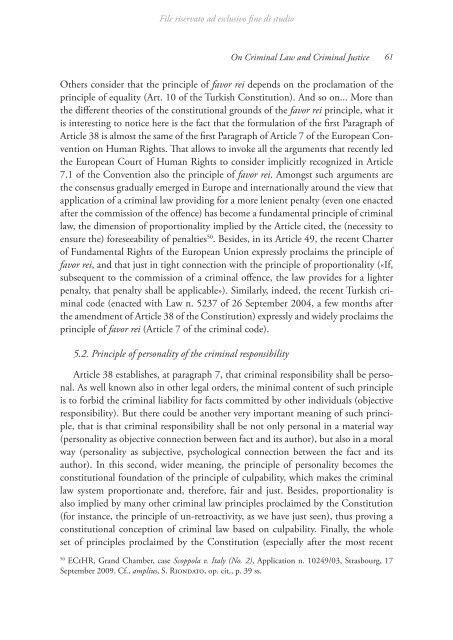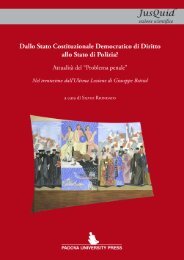il libro - Silvio Riondato
il libro - Silvio Riondato
il libro - Silvio Riondato
Create successful ePaper yourself
Turn your PDF publications into a flip-book with our unique Google optimized e-Paper software.
F<strong>il</strong>e riservato ad esclusivo ne di studio<br />
Others consider that the principle of favor rei depends on the proclamation of the<br />
principle of equality (Art. 10 of the Turkish Constitution). And so on... More than<br />
the dierent theories of the constitutional grounds of the favor rei principle, what it<br />
is interesting to notice here is the fact that the formulation of the rst Paragraph of<br />
Article 38 is almost the same of the rst Paragraph of Article 7 of the European Convention<br />
on Human Rights. at allows to invoke all the arguments that recently led<br />
the European Court of Human Rights to consider implicitly recognized in Article<br />
7.1 of the Convention also the principle of favor rei. Amongst such arguments are<br />
the consensus gradually emerged in Europe and internationally around the view that<br />
application of a criminal law providing for a more lenient penalty (even one enacted<br />
after the commission of the oence) has become a fundamental principle of criminal<br />
law, the dimension of proportionality implied by the Article cited, the (necessity to<br />
ensure the) foreseeab<strong>il</strong>ity of penalties 50 . Besides, in its Article 49, the recent Charter<br />
of Fundamental Rights of the European Union expressly proclaims the principle of<br />
favor rei, and that just in tight connection with the principle of proportionality («If,<br />
subsequent to the commission of a criminal oence, the law provides for a lighter<br />
penalty, that penalty shall be applicable»). Sim<strong>il</strong>arly, indeed, the recent Turkish criminal<br />
code (enacted with Law n. 5237 of 26 September 2004, a few months after<br />
the amendment of Article 38 of the Constitution) expressly and widely proclaims the<br />
principle of favor rei (Article 7 of the criminal code).<br />
5.2. Principle of personality of the criminal responsib<strong>il</strong>ity<br />
On Criminal Law and Criminal Justice<br />
Article 38 establishes, at paragraph 7, that criminal responsib<strong>il</strong>ity shall be personal.<br />
As well known also in other legal orders, the minimal content of such principle<br />
is to forbid the criminal liab<strong>il</strong>ity for facts committed by other individuals (objective<br />
responsib<strong>il</strong>ity). But there could be another very important meaning of such principle,<br />
that is that criminal responsib<strong>il</strong>ity shall be not only personal in a material way<br />
(personality as objective connection between fact and its author), but also in a moral<br />
way (personality as subjective, psychological connection between the fact and its<br />
author). In this second, wider meaning, the principle of personality becomes the<br />
constitutional foundation of the principle of culpab<strong>il</strong>ity, which makes the criminal<br />
law system proportionate and, therefore, fair and just. Besides, proportionality is<br />
also implied by many other criminal law principles proclaimed by the Constitution<br />
(for instance, the principle of un-retroactivity, as we have just seen), thus proving a<br />
constitutional conception of criminal law based on culpab<strong>il</strong>ity. Finally, the whole<br />
set of principles proclaimed by the Constitution (especially after the most recent<br />
50 ECtHR, Grand Chamber, case Scoppola v. Italy (No. 2), Application n. 10249/03, Strasbourg, 17<br />
September 2009. Cf., amplius, S. <strong>Riondato</strong>, op. cit., p. 39 ss.<br />
61



